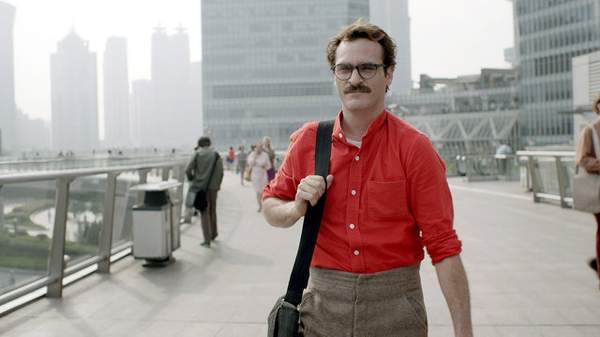Overview
The future. What will it look, feel, sound, smell and taste like? What's the logical progression of everything that's happening today, in our rapidly changing technological and social landscape? Will the future be like now, only more so?
Auteur film director Spike Jonze answers this question via the plaintive eyes and breaking voice of Theodore (Joaquin Phoenix) as he wanders the Los Angeles of the near-future in Her. This future is a warm and technologically intuitive space, where highly evolved, Siri-like operating systems are capable of falling in love with humans. Watching the film, we found that despite its themes of loneliness and emotional surrogacy, there's a few predictions we hope do come true.
Computers are basically therapists
In the future, while artificial intelligence-based computers programs like Samantha (dreamily voiced by Scarlett Johansson) definitely listen to what you say, what really matters to them is how you say it. In classic psychoanalyst form, they listen for signs of hesitation, anxiety or affection. When his OS quizzes him about his feelings for his mother, Theodore's ambivalent tone tells the computer all it needs to know. Video games are just as savvy: Theodore spends a lot of time chatting with a funny little virtual creature with a bad case of Tourette's, whose needless rudeness greatly amuses him. So, what happens when an OS can sense and respond to your emotions? You end up getting entertainment, companionship, sympathy and advice from an entity that also has the power to sort through infinite data and provide all kinds of practical services. It becomes the 100 percent efficient bosom friend you never had.
The pedestrian is king
Today, Nobody Walks in LA, because everyone has a car. It's a proverbial truth well documented by SNL's The Californians. But Spike Jonze's' LA of tomorrow is one big, car-less New York Highline (he even consulted with the Highline's creators to get the feel right). Broad and tranquil sky walkways connect Theodore from work to home, and a metro system takes him from the city to the beach. What's the advantage of travelling through life on foot? Safer, more populated public spaces; a healthier body; and the end of road rage. Despite Her's overarching theme of loneliness, from developments here in Sydney we know that pedestrian spaces tend to attract food trucks, live music and events, making everyone feel happier and more connected to their local community. Something we didn't see in the film that we hope to see in the cities of the future, is a skyline of buildings carpeted with vertical gardens.
Clothes, technology and interiors are kind of friendly-looking
Do we see any robo-babes or steampunks in future LA? No. We see an affluent middle-class clad in garb that references the 1930s, with high-waisted pants and clean colour-blocking. No one's trying to look cutting-edge; just well-presented. The style is actually shoppable — check out Opening Ceremony's Her capsule collection. As for interior design and gadgets, there's none of the usual super-slick chrome interiors, overly stark minimalism and cold blue lighting that films usually use to represent the world of the future. Nor are there paleo-future aesthetics or dystopian ruins. Instead, we experience lights that gently illuminate when Theodore enters his apartment; a smart pocketbook that looks like an old-timey picture frame; an elevator whose walls display a moving silhouette of trees. It's a wholesome, comfortable environment accessorised with objects and furniture in shades of blush and ochre. In fact, the colour blue is largely filtered out of the movie, to create a feeling of warmth and comfort deliberately at odds with Theodore's personal isolation. While we can't exactly filter out blue IRL, we Spike Jonze's vision of a cosy, inviting built environment that isn't trying too hard to be cool.
Communication is hands free and softly spoken
In future LA, almost every appliance is a voice-activated Siri. From printers to video games to letter-writing computer programs, machines respond to softly murmured voice commands much like Google Glass today. Riding the metro home, Theodore discreetly instructs his smart pocketbook to show him nudie pictures of a pregnant celebrity. What's the upshot of this subtle way of communicating needs? People become more softly spoken in general. The trend carries into advertising: Theodore first hears about the new artificially intelligent OS from a slo-mo advertisement in which a soothing voice heralds a new era in technology. Machines themselves also speak enticingly, as epitomised by the husky Samantha .
Her is in cinemas now. Read our review of the movie here.
